If you’re here, you already know the benefits of SEO and how much money you can make from it. So, I won’t dilly-dally with such information.
Instead, I’ll dive straight into the 5-steps you need to learn SEO from scratch.
If you already know some of the steps, use the navigation panel on the left to skip to a desired stage.
Let’s begin…
Step 1: Learning the Basics — What Is SEO & What It’s Not; How Does It Work?
In this section, I’ll walk you through what SEO is & is not and its importance.
Definition
SEO (Search Engine Optimization), according to Google’s SEO Starter Guide, involves modifying parts of your website to increase user experience and performance in organic search results.

While that definition is perfect, I’d like to add that SEO isn’t always “small modifications.” It can also be a total face-lift for your website.
From practical experience, the latter is often the case. You’d have to modify everything on your site: from content, design, and backlinks to even anchor texts.
Bottom line: the modifications to make on your website will depend on the result of your SEO audit.
Either way, the aim of SEO is clear:
Increased user experience = rank better in organic search results = enhanced traffic = improved sales
Should You Do SEO?
Why not?🤷♂️
- Don’t you want more calls for your business?
- Don’t you want to increase your revenue?
Doing SEO is a no-brainer if you want more calls, in-office visits, and increased revenue. Still not convinced?
Read the specific reasons you should do SEO and how it can help your brand and business.
SEO Increases Traffic 📈
Businesses thrive on traffic generated. The higher traffic you get, the more chances of conversion.
If people don’t know about your brand, products, or services, your offer or unique quality won’t matter. You won’t make sales.
But all that narrative could change with SEO. SEO can fetch millions of organic visitors monthly — more than social media or other channels.
Bold claims, eh?
Well, I have proof of that claim. Check this out:
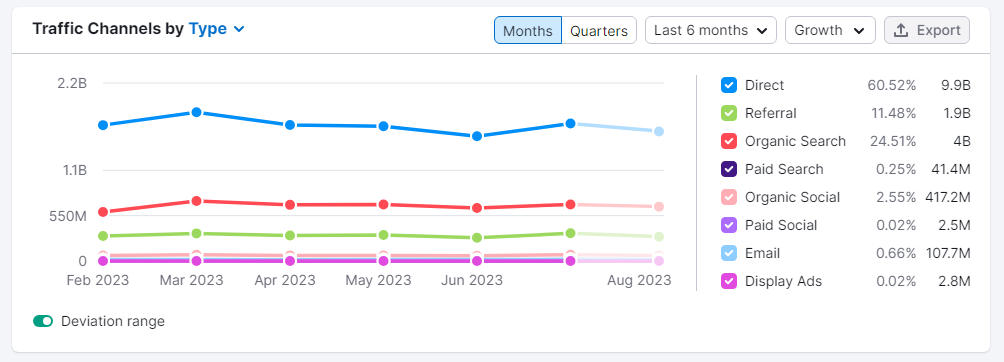
From the picture (between Feb – Aug 11, 2023), Amazon received 2.8B traffic. Of the lot, organic search is the second channel that draws in the most traffic.
At 4B traffic, organic search outstrips the pull of paid search (41.4M), organic social (417.2M), paid social (2.5M), email (107.7M), and display ads (2.8M) combined.
Imagine that!
Organic search is 7x the combination of 5 traffic channels (571.6M). Mind-blowing, eh?
Well, that is the power of SEO!
Side note:
Google is a formidable search engine; make it the cornerstone of your SEO learning process. No diss to Bing, DuckDuckGo (DDG), or Yep. But the “big G” rules. Why?
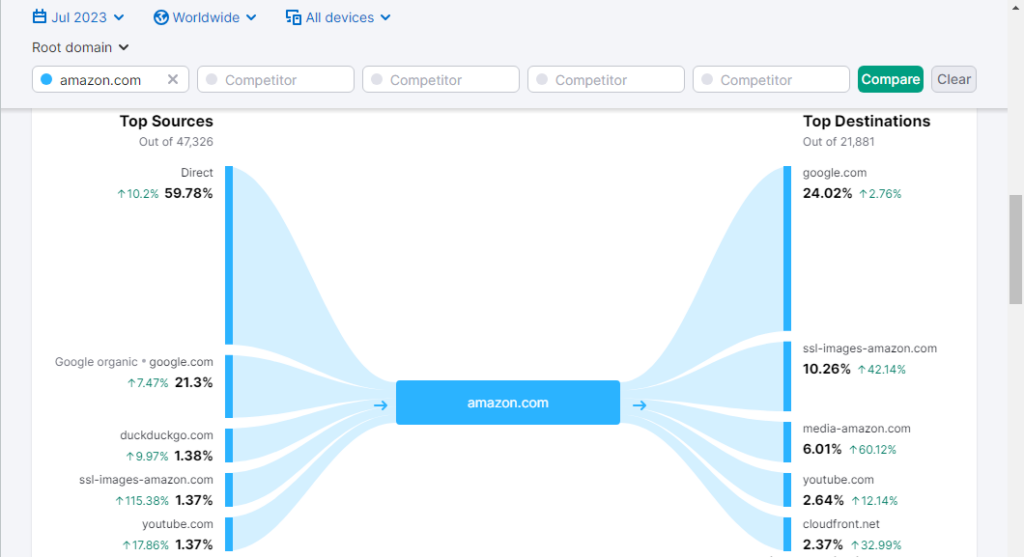
Using Amazon, Google was responsible for 21.3% of the total traffic for July 2023. That figure is incredible, considering DDG, another top channel, accounts for only 1.38%.
Traffic Leads to Sales 💰
When you get views, you can talk about conversion (sales). And the best part: SEO (particularly Conversion Rate Optimization, CRO) also helps with the latter.
So, how much conversion rate can you expect with SEO?
According to Statista: the conversion rate for all verticals is 2% in Q1, 2023.
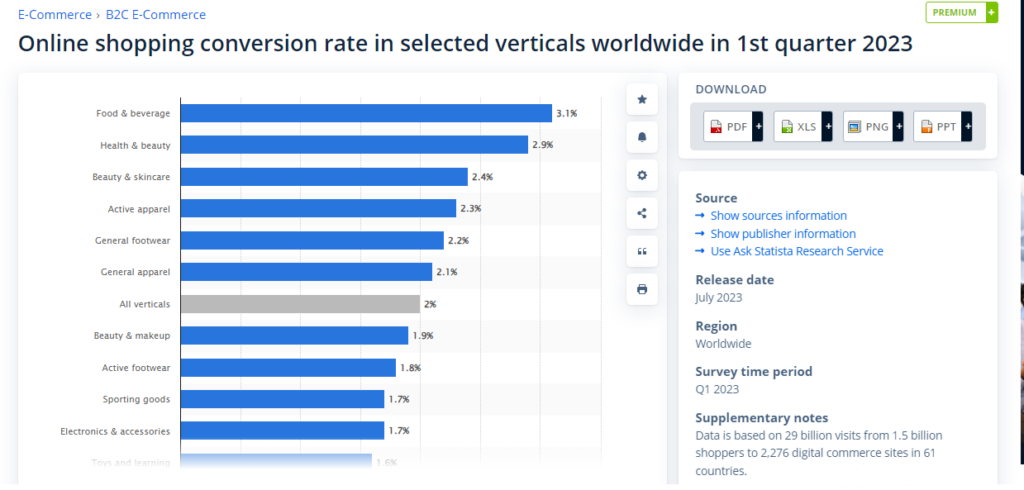
How much sales will 2% fetch?
Let’s go back to our example — using Amazon. Check this out:
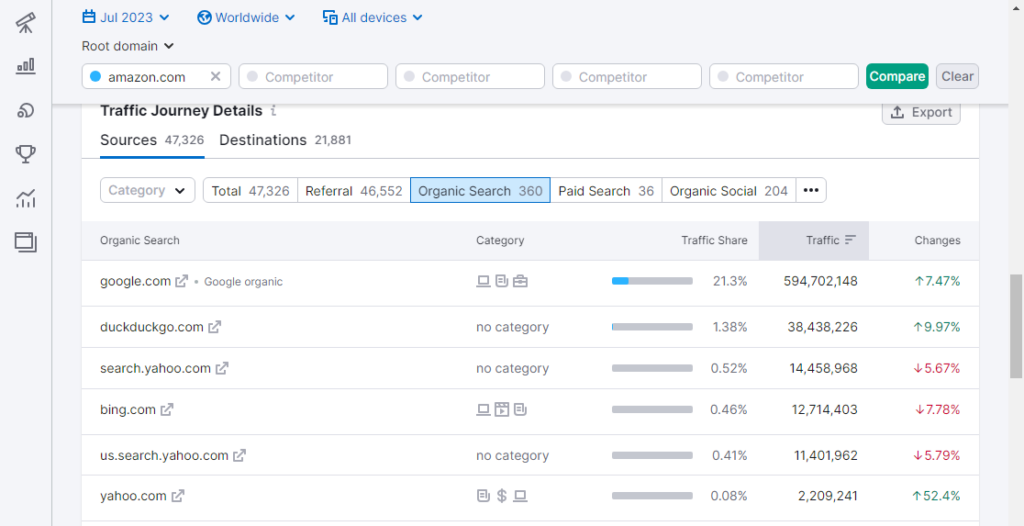
From the picture: Amazon received 594 million organic traffic from just Google in July 2023. What’s 2% of that figure — assuming organic visitors bought only a $1 product each?
Let’s do the math…
2% of 594 million = 11.88 million visits
11.88 million * $1 = $11.88 million
Imagine the numbers — $11.88 million monthly from just Google organic search results. How much more from other search engines?
Bottomline: SEO is a cash cow.
SEO Is Free
Yes, you read the heading right. SEO is free.
But what about the tools?
FYI:
- Google Search Console [GSC] is FREE — the same thing applies to Google Analytics [GA] and Google Business Profile [GBP]: these are the basics you’d use for SEO.
- Third-party webmaster tools like Ahrefs, Semrush, and Moz have limited versions you can use for basic SEO tasks. It all cost $0.
The only thing that costs money in SEO is task delegation. Otherwise, Google would charge businesses and individuals for its indexing & crawling services.
My take: you have nothing to lose focusing on how to learn SEO. It is free [but can be time-consuming] and has unmatched ROI.
You’re on the right path to digital marketing success.
What SEO Is Not?
❌️ Manually Gaming Search Engines
The modifications in SEO revolve around people as much as the search engine. In other words, focus on offering value first. Readers will appreciate it. Search engines will also — and your pages and revenue charts will smile.
Anything outside that isn’t SEO. Practices like “black” or “grey” hat strategies will only dent your SEO results. Avoid them.
❌️ Paid Search
Unlike black and grey hat strategies, paid search is not a violation of search engine rules. In fact, I often advise my clients to combine it with SEO.
Meaning: paid search isn’t SEO. The “payment” disqualifies it.
Check this Ahrefs’ visual representation to understand my point better:
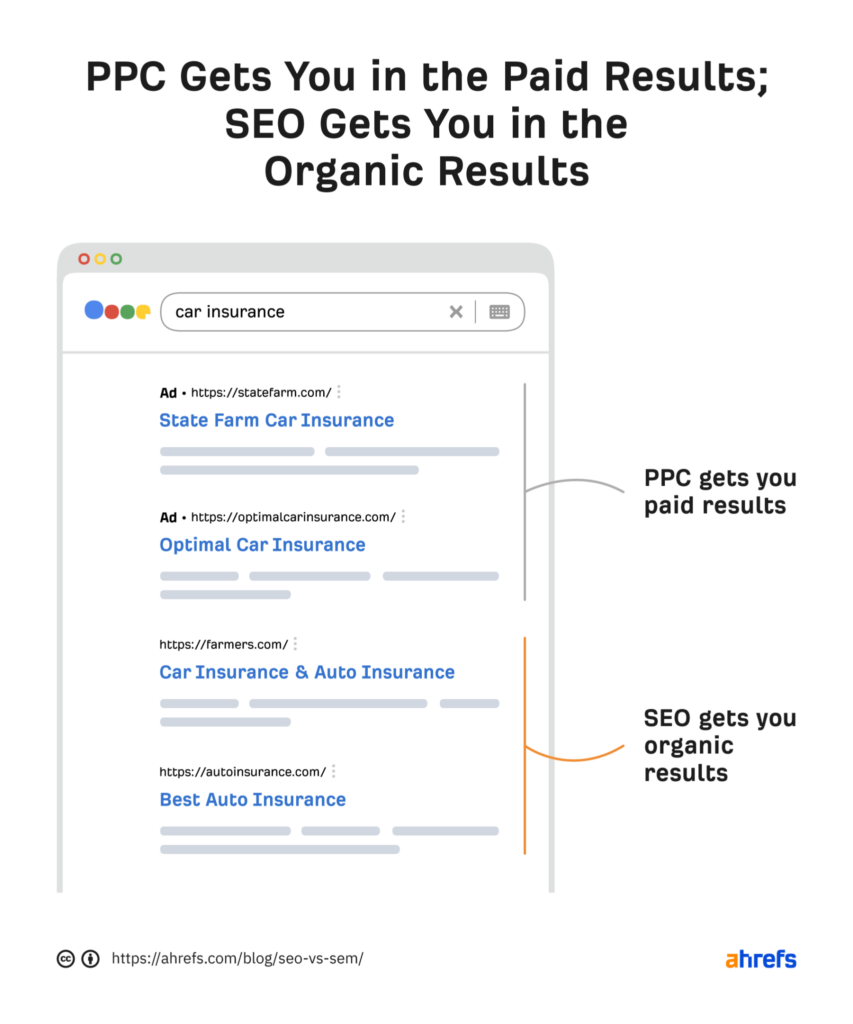
From the picture: “paid results” appears before “organic results.” And they often come with the “sponsored” or “ad” tag.
Fun fact: despite showing later on Search Engine Result Pages [SERPs], organic search fetches almost 2x (53%) the traffic of paid search (27%) — Yoast.
How Do Search Engines Work?
Remember that SEO is modifying parts of your website to please search engines (and people). In other words, “search engines” must be big deals.
But to make the RIGHT modifications, you must first understand how search engines work. I’ll cover the basics in this section.
Let’s get to it…
What Are Search Engines?
Search engines do one thing: they provide answers to users’ queries using a 3-way model:
- Crawling
- Indexing
- Ranking
Crawling
Crawling is simply the discovery phase of search engine operations. This is where search engine bots crawl the web for new and updated content.
The bots (robots, spiders, or crawlers) start from a single page and then branch out to other pages via links.
For example, if a bot crawls my homepage, it will also crawl the “about,” “services,: & “blog” pages because they were linked to the homepage.

Here is a more detailed overview of crawlers in action:
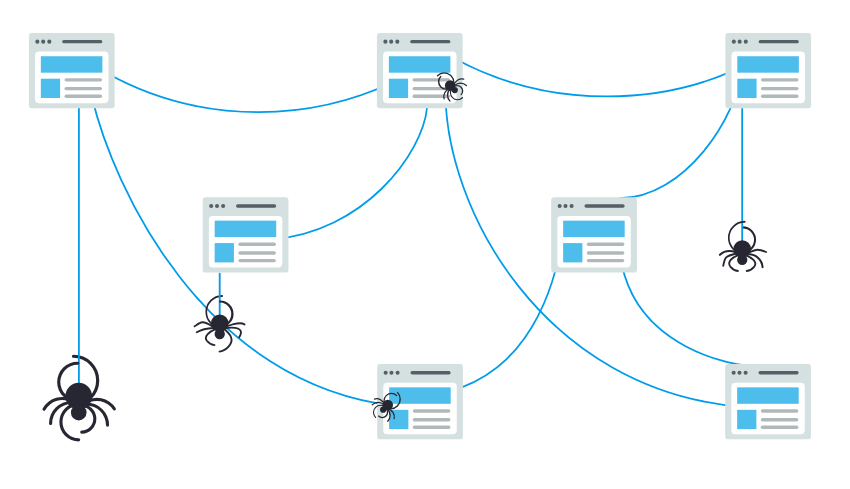
Source: Moz
Can you see how the spiders move from one page/site to another via the website (links)?
Bottom line: without crawling, search engines won’t find your pages. In that case, you can’t do SEO.
Note: search engine bots only crawl your site directly when there’s no robots.txt file.
If your robots.txt file is available but inaccessible, bots won’t crawl your site.
What Is Robots.txt?
It is a set of instructions that suggest what parts of a site should or shouldn’t be crawled — and at what speed.

Source: Conductor
FYI: crawlers prioritize robots.txt over sitemap. The former is a set of instructions. The latter is only a list.
Note: images also have sitemaps. They aid image crawling and indexing.
Indexing
After discovery, the next phase is storage. This is the entire point of indexing.
Here, the content and pages discovered by crawlers are organized and stored to be displayed for users.
Think of the process as updating your library on Spotify and adding a song to your liked section.
That way, the song is accessible when you need to listen.
Note: Like in crawling, you can instruct search engine bots what pages to index or not using robots meta directives.
What Are Robots Meta Directives?
These include the “meta robots tag“ and “x-robots tag.”The former is used within the “head” of the HTML of a webpage.

The latter is used within the HTTP header response.
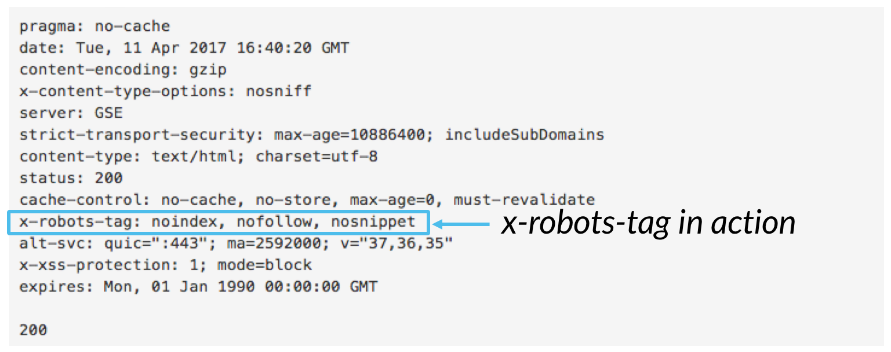
Either way, robots meta directives instruct search engine bots on the:
- web pages to index or not,
- links to follow or not, and
- Pages to archive or not
A fun but quick exercise about crawling and indexing:
Let’s check if your site is crawled and indexed.
Visit Google; Type “site:yourdomain.com”
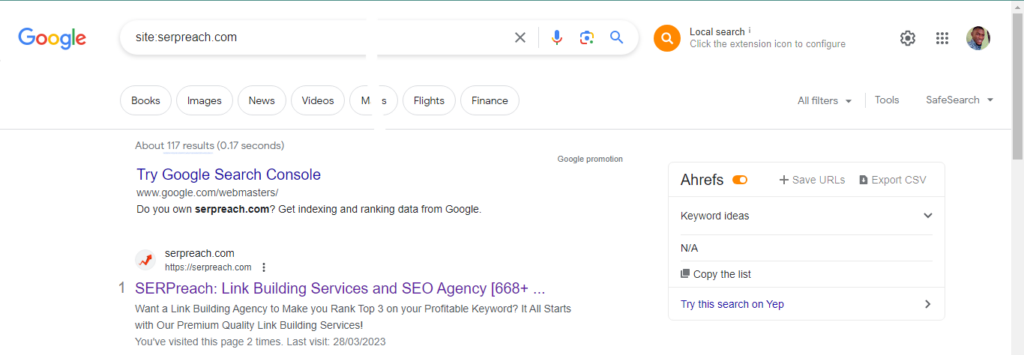
From the picture: 117 pages are crawled and indexed.
Ranking
While we SEOs call this phase ranking, it is simply a recovery stage. Let me explain.
The purpose of “crawling and indexing” is for search engines to store content. But why?
Users…
When users need information, search engines can recover it.
However, bots don’t recover and display just any information. They show the relevant (that match the users’ query) ones in order of relevancy — hence ranking.
Mind you, the analogy above is only a simple description. So much detail goes into ranking (determining the relevancy of indexed content).
So much so that search engines have algorithm systems and ranking factors.
Google, for example, has over 200 ranking factors (only 8 are proven). Algorithm updates are more — running to hundreds or even thousands.
Funnily enough, when I started SEO in 2009, only a few algorithm systems were in place (Big Daddy, Caffeine, Florida Jagger, and Vince). Today, the number has increased exponentially.
For context, there are already 3 updates just in Q1 2023 — Google Search Central.

Beyond algorithm and relevancy, rankings rely on users’ interactions. In a Rand Fishin (CEO and co-founder of Sparktoro & Moz) experiment, he encouraged followers to check out an article on the 7th position on SERPs.
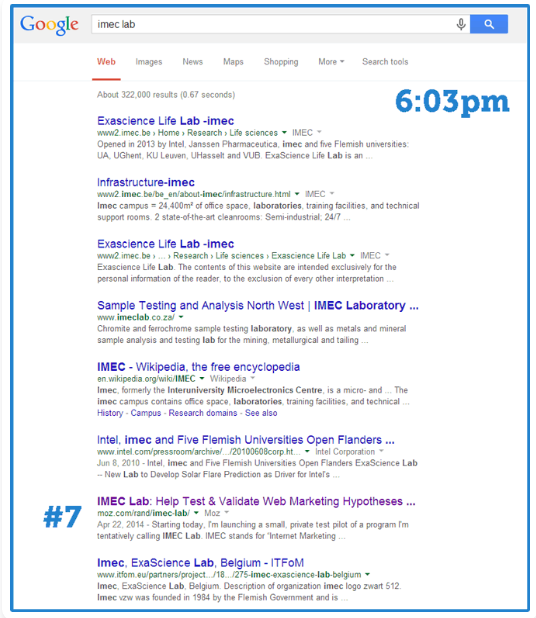
3 hours, 250 people in action, and 228 visits later, the post ranked number 1 on SERPs.
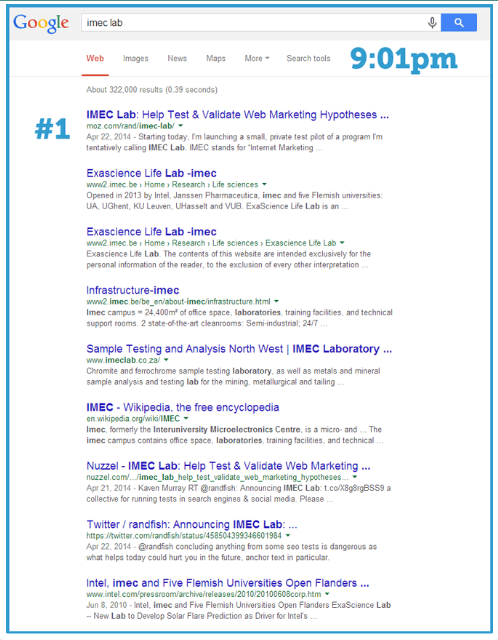
Now, we have handled the basics. Let’s dive into the more technical parts of learning SEO.
But don’t fret; I’ll keep the technicalities as simple as possible.
Step 2: Keyword Research
The chances are that you have seen SEOs throwing several metrics (KD, CPC, etc) around in groups/forums. Don’t be put off by the shiny terms and tools.
Focus on the basics.
And what are the basics?
The 3 secrets of keyword research:
- What are users looking for?
- How many users are looking for that same thing?
- What format is the information most preferred?
What Are Users Looking For?
From experience, I’ve seen many businesses focus on themselves and neglect what their customers want. That’s not how to learn SEO or how it works.
For example, you might want to target “installation of shingles and air conditioners” — because the prices are relatively high.
On the other hand, customers might be looking for repair or cleaning agencies.
In that instance, SEO won’t bring results because you’re not answering customer queries.
So, to start keyword research or SEO generally, ask:
- What do my ideal customers want?
- What are their pain points?
- What services do I offer that solve those pains?
- What exact words are customers typing in search queries?
At this point, you should have ideas of what users have. For example, say users need “shingle repair,” “window cleaning,” or “deck washing.” Those are called seed keywords.
Now, let’s plug the seed keywords into a keyword research tool.
Recommendation: Ahrefs and Semrush are the best. Plus, you can use their keyword research tool for FREE.
Using Ahrefs:
- Visit Ahrefs Keyword Generator
- Input your seed keyword, select the country, and click “Find keywords.”
- Remember to choose the search engine of choice (Google, Bing, YouTube, or Amazon)
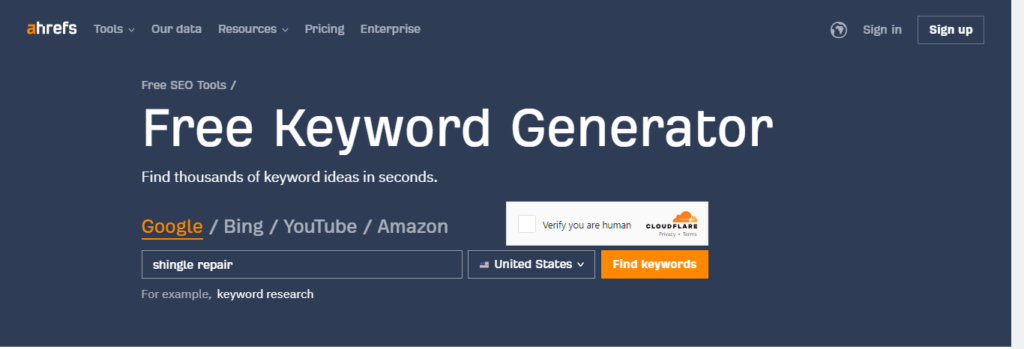
- You’ll get results like the below:
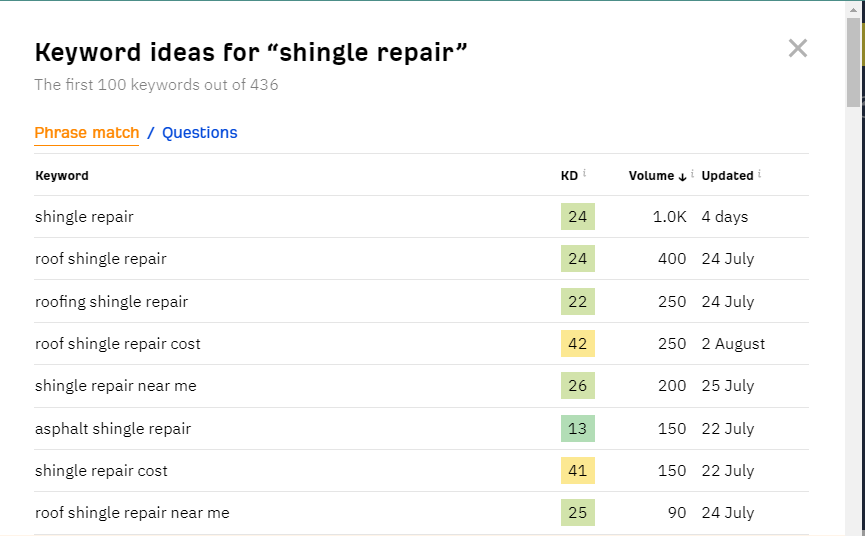
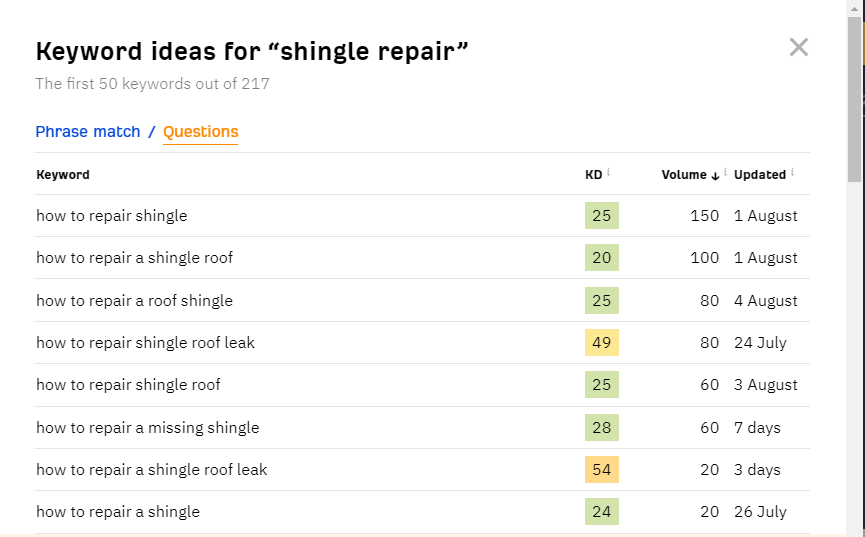
FYI: KD is keyword difficulty — how easy it is to rank for a keyword. The lower the score, the better.
Using Semrush:
- Visit Semrush Keyword Magic Tool
- Input your seed keyword into the search bar, and click “search.”
- You’ll see a result like this:
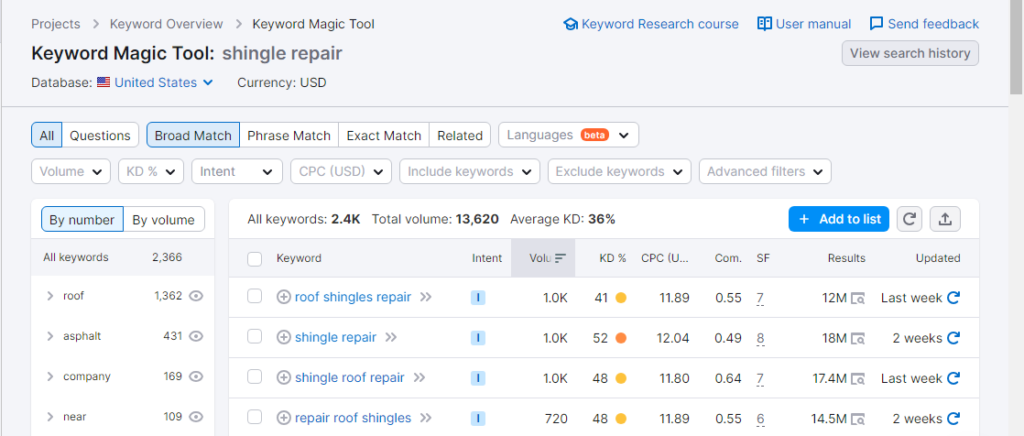
The KD% is not encouraging. No green light, unlike in Ahrefs. Fortunately, you can fix it. Here is how:
Toggle the filter a bit to get easier-to-rank keywords.
- Click the KD% filter; change it to “very easy.”
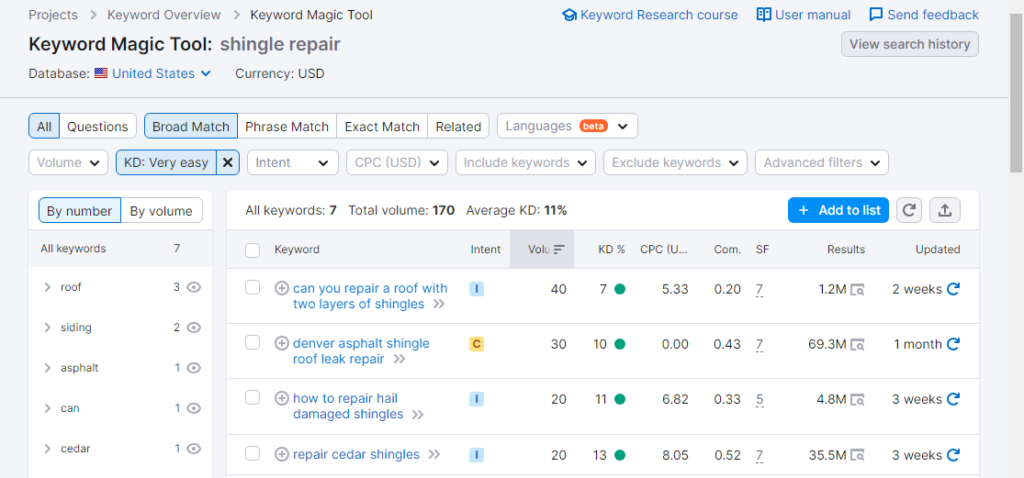
That’s keyword research in a bit. Simple, eh?
Note: that’s the rookie level. Let’s proceed to the next level.
How Many Users Are Looking for That Same Thing?
While a keyword might be easy to rank, it might not be the best for you. A keyword with low search volume won’t add traffic to your pages or bring sales.
In that case, your SEO would have been unsuccessful.
So, what should you do?
Target low-volume but specific keywords. These are called “long-tail keywords.”
In my experience, “long-tail keywords” get more sales and conversions than “seed keywords.” For example, a user who searches for “can you repair a roof with two layers of shingles” is more action-oriented than a generic “roof shingles repair.”
The chances are that the former will hire anyone that replies to the question. The latter, on the other hand, might just be surfing the net.
Another factor to consider is the seasonal trends of your keyword. Use a tool like Google Trends to see when the query is at its peak.
What Format Is the Information Most Preferred?
The final and most critical part of keyword research is answering users’ questions in the best format. For this, you must understand that not all queries are the same.
You can’t always write informational content. Transactional or commercial articles might be what you need.
So, how can you confirm the nature of users’ queries?
- Type your keyword into Google’s search bar
- Check the format of the result displayed
Let’s test with two keywords:
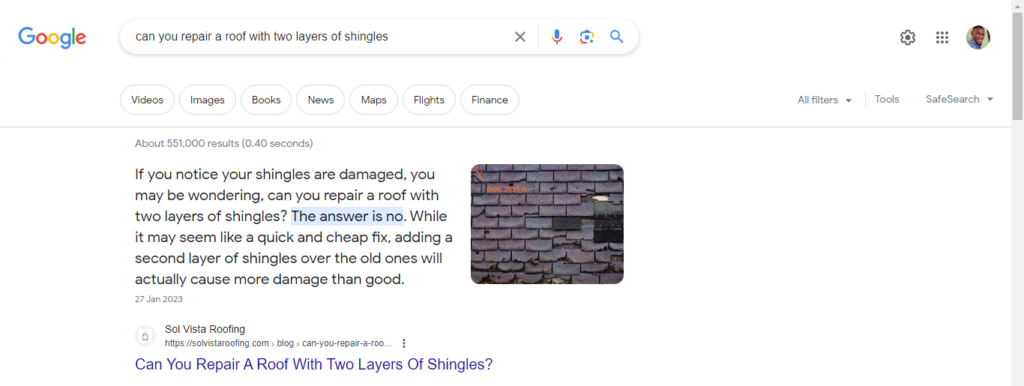
My take: the keyword here is an informational query. And from the search results, you can tell video content is favorable.
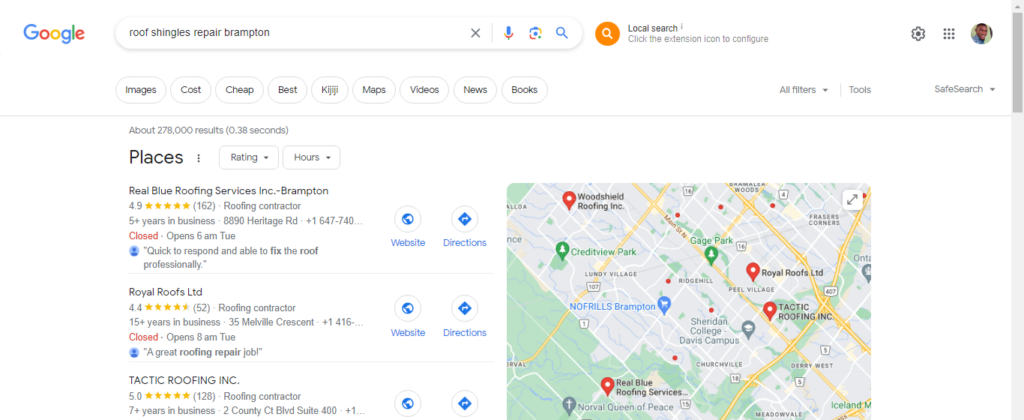
My take: the keyword here is a local query. You can rank better for this using maps and clear descriptions of how to locate your business in the city.
Step 3: On-page Optimization
Keyword research and on-page optimization are subcategories of on-page SEO. And they work together. How so?
The keywords generated are only foundations. You need to write content around them. The “writing and strategy” is on-page optimization.
Note: content is just one part of on-page optimization. On-page SEO can also be technical with elements like meta tags.
But don’t fret; I’ll break the technicalities down — from the simple on-page optimization tweak to the most technical fix.
Use AI Writers For Content Or Not?
We live in an AI world where AI writers are pumped out almost daily. Closercopy, Jasper, Quillbot, Grammarly AI, Surfer AI. And the list goes on. And there’s the unicorn of the lot: ChatGPT.
I know you’ve definitely heard about the tools. So, should you use them?
Frankly, I have no issues with AI writers. But as a beginner to SEO, I recommend you learn the basics of writing first. Otherwise, you’ll never know what makes content engaging or master research.
Tip: using an AI writer is not taboo. However, ensure the content is edited for flow and tone.
Whether AI-generated or human-written, what matters is the quality of your content. Does it provide value?
- Did you answer users’ queries?
- Is the content thin and packed with fluff?
- Are there practical examples?
- Are the tips or steps actionable?
You’d hardly rank or get traffic if your content is not helpful. Also, adopt Google’s E-A-T. Write with experience and show authority. Then, you’ll gain the trust of readers and search engine bots.
While you’re at it, avoid duplicate or spun content. Show your personality and add your unique examples. All these will make your articles stand out long enough to gain attention.
Keyword Stuffing
Keyword stuffing won’t make your articles rank better on search results. Instead, it makes the information stiff and boring.
Unfortunately, users will notice the unnatural use of keywords and bounce off your page. When that happens, your SEO results will be affected.
So, am I saying not to include keywords in your content?
No. Optimize your content with your desired keywords. But only do it naturally and strategically.
I recommend using keywords in headings, introduction, and conclusion — if naturally possible.
FYI, writing your content “naturally” will help you to rank for other terms. If you were busy keyword stuffing, that wouldn’t happen.
So, keyword stuffing doesn’t work?
It doesn’t work in the long run. If you eventually rank for a while but don’t provide value to readers, you’ll eventually lose the ranking.
Skyscraper Content
As a beginner to SEO, I also once struggled with knowing the word count for my articles and the format they should be in. It all changed when I learned the skyscraper technique.
Let me describe how this technique works.
Remember that during keyword research, we wanted to confirm the nature of a query. The same method applies to the skyscraper technique.
The difference: you’ll go one step further here — click the ranking articles (the skyscraper articles) for a desired query.
- Next, study the format of the articles
- What questions were answered in the content?
- Were there any similarities in the articles? Are the examples the same?
- Are there gaps or questions yet unanswered?
- What is the length of the article?
Now, can you write something better in a relatively longer text?
FYI: you don’t always have to write longer articles than what’s ranking. Content is only one of the factors for SERP features.
Other factors are also in play. Besides, if you can answer a question with 300 words, don’t write a 3000-word article.
So, how can you make your content better?
- Infuse personality
- Add media content
- Interview or quote subject matter experts
- Repurpose your articles into videos; embed the video within that same content.
- Add downloadable templates to your how-tos.
Image Optimization
Like text, images can be optimized too. In fact, a well-optimized image will rank your page in the Google Images section.
Ranking purposes aside, optimizing your images aids user experience. Here is how:
Images are heavier than text. As a result, they can lead to slow-loading pages. Unfortunately, that could increase your bounce rate.
So, how does image optimization help with bounce rate?
During optimization, images are compressed — the size will reduce, but there will be quality retention.
Beyond sizing, optimization helps search engine bots understand your index images. Here is how:
Bots can only read texts. Unfortunately, images are not in that format. However, you can apply a text-related feature (alt text) to your image to facilitate crawling and indexing.
Pro tip: the alt text is another spot to include your keywords. But remember to do so only when the inclusion is natural.
Beyond Content
Here are other basic on-page optimizations you should note:
- Title tags — help search engine bots understand the gist of your content. These tags are what pop up on search results. So, include your keyword here.
And while you’re at it, place the keyword close to the beginning of the title. Also, limit the length to 60 characters as much as possible.
- Meta descriptions — provide extra content to complement the title tags. It also shows up on search results. Your keyword should be included here as well.
About the length, limit your meta descriptions to 300 characters max.
- URL — prioritize short URLs. Also, include your keywords.
But don’t overdo it; if you can only insert the seed keyword, that’s okay.
Further reading: Adding Keywords To Your Website
Step 4: Technical SEO
I don’t mean to scare you. But technical SEO can be a pain in the ass. It often involves the backend of website design.
- How do the different elements of a website work?
- How do search engines interpret the element?
- How do users interact with the elements?
If such areas are not your strong suit, outsource to an expert.
Nevertheless, a basic understanding of how technical SEO works is required. This section will guide you.
Let’s dive in.
How Do the Different Elements of a Website Work?
Before optimizing a website, you should at least know how it works. Otherwise, you’d miss the basics and disrupt your site operations. Worse case: you will still fail in SEO.
So, how does it all work?
The basics:
- You buy a domain name
- The domain name gets an IP address
- Users type the domain into a browser
- Browsers find the IP address, interpret, and assemble resources
- Then, you see the website
Now, let’s talk about the elements.
Website at the barest work with 3 elements:
- HTML — describes the structure of a site
- CSS — describes the appearance of a site
- JavaScript — describes the behavior of a site
Now, you understand how websites work. Let’s see things from the lens of search engines. How do they interpret your site?
How Do Search Engines Interpret the Element?
Like you have HTML, search engines have schema markup. Schema organizes and labels content in a way crawlers can understand.
The process of schema structuring content for search engines is called markup. Hence “schema markup.”
Note: schema can be somewhat confusing. I recommend you outsource this as a beginner to SEOs.
How Do Users Interact With the Elements?
SEO is just as focused on users as it is on search engines. In the end, pleasing people is the goal of the bots.
So, how users interact with your site is crucial. Remember Rand Fishkin’s experiment. It shows that human interaction and authentic social shares can fetch you traffic.
So, how can you improve users’ interaction with your site?
- Ensure your pages load faster enough. Reduce or remove elements that might slow down your site. And if they can’t be compressed, lazy load them. How?
Show a blurry preview. Users should click on the images only when they are interested.
Read more on the importance of page speed and how to optimize it for SEO…
- Prioritize responsive design. Regardless of users’ devices, your content should be well structured.
While this factor might seem inconsequential, it goes a long way to improving user experience.
- If your business or brand has a global audience, your site should reflect it. You might need to create multi-regional and multilingual websites.
Step 5: Link Building
Content and website design are crucial elements of SEO. However, those two alone aren’t enough to rank on search results.
Your competitors probably have responsive websites and stellar content. In fact, that should be the bare minimum.
In other words, you need to do more to get to the first pages of SERPs. This is where link building can help.
Link building adds a layer of authority to your pages and website. It upvotes your site for people and search engine bots.
So, how can you build links?
Before we dive into that, let’s discuss 3 crucial elements.
- Anchor texts — these are placeholders for links. They can be a phrase match or generic. Either way, they help search engine bots understand what the outbound link entails.
- Link profile — this is the overview of your inbound links. It details the quantity, quality (spamminess), diversity, and the source of the links. The richer your link profile, the higher your domain authority/rating.
- Follow and nofollow links — there is something called link equity/juice in link building. It means authority flows from one page to another.
However, you can tape off the flow with the follow and nofollow tags. Either way, the outbound page will still get traffic.
Back to how to build links, follow these guidelines:
- Avoid low-quality links from link farms and PBNs. They are necessarily harmful, but they won’t increase your authority. You’d only waste your money.
- Never patronize black hat SEOs. They can be illegal and criminal — for example, hacking a site to include a backlink. Plus, you could be suspended from search results.
- Prioritize earned links over purchased links.
That said, here are the top 3 ways to earn links:
Guest Posting
Don’t be put off by all the talk of guest posting being a stale link building method. You’re a beginner; you have nothing to lose.
Besides, there are top sites where you can publish your guest posts. Take Buffer, for example. It is a 91 DR site, and the content team is currently accepting guest features.

Say the backlink will be a “nofollow.” But what about the traffic potential?
For context, Buffer will send your post (with a link to your site) to over 90,000 potential customers. That’s a big deal.
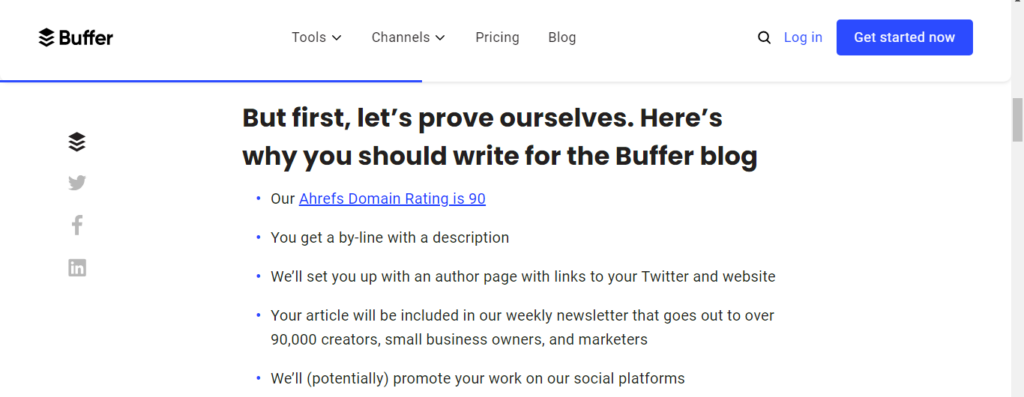
Bottom line: guest posting can still be resourceful to earn links.
So, how do you find more authority sites like Buffer?
- Reach out to creators in your community; ask where they guest posts
- Type “guest post” + “niche” into Google
- Use Ahrefs Website Authority Checker to weigh the results
- Don’t waste your time with any site with < DR 30
Linkable Assets
Linkable assets are simply what other businesses (even your competitors will naturally link to). Examples of these include free tools like Ahrefs’ Website Authority Checker and Backlink Checker.
Let’s check the number of backlinks the checkers receive.
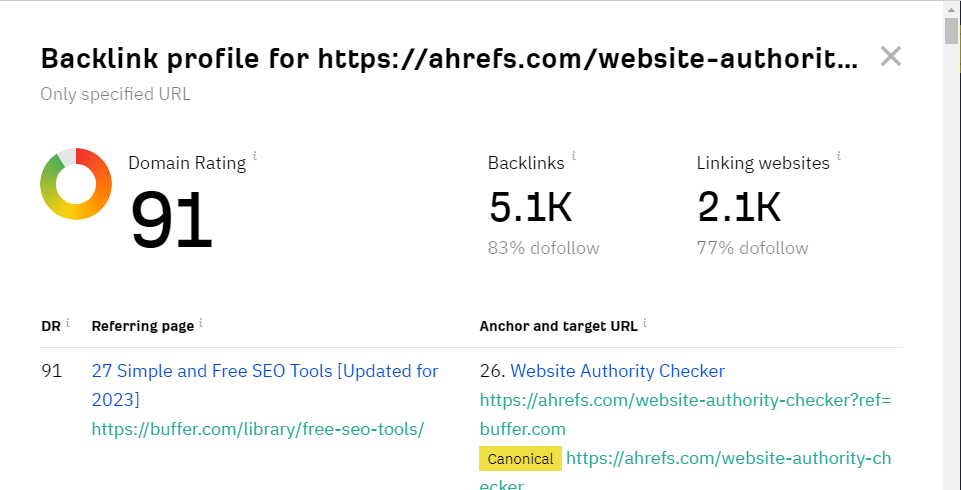
The Authority Checker has over 5000 inbound links from 2000+ websites.
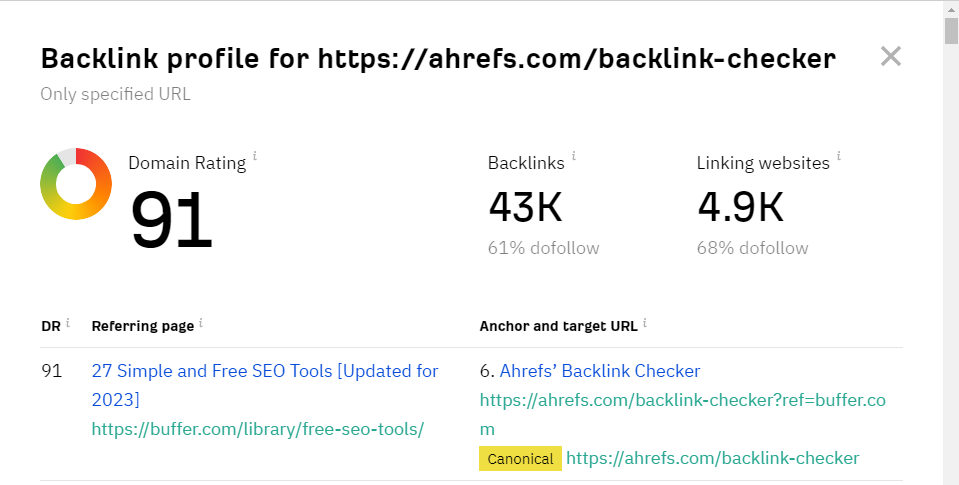
The Backlink Checker has 43,000 inbound links from 4900 websites.
Together, Ahrefs has almost 50,000 backlinks from 7000 websites. Imagine such numbers from just two tools.
How many guest posts must you write to reach such figures?
Hint: check your niche; see if you can create any tool for free. BTW, your “tool” could be as simple as a predefined Google Sheet. Just offer value.
Note: Linkable assets are not limited to tools. They also include resource pages, infographics, and statistics.
Local Community Involvement
This method is arguably the most beginner-friendly and pocket-friendly. You only have to do your best in your community and project a newsworthy story.
Just do your bits and wait for local news to capture the story. Your business will go viral as a result.
Can’t wait?
Be the source of news!
Join platforms such as Help A Reporter Out [HARO] as a source. Provide answers to journalists’ questions and earn a backlink as thank you.
Also, you can pitch your favorite journalists about a newsworthy event in your business or community. If the news is juicy enough, you’ll get a feature on national news and attract handsome traffic to your site.
If you’ve been hands-on so far, you’ve successfully learned SEO. You have the fundamental SEO knowledge of most self-acclaimed SEO gurus.
However, there is one last step. It is how you know if your SEO campaigns are successful.
How to Measure SEO Success as a Beginner?
Like anything, success in SEO isn’t black and white. Your goal ultimately determines what success is to you.
So, what is your goal?
Do you only want to increase engagement with your content?
Do you want to enhance time spent on the page, pages per visit, and scroll depth?
If such are your end goal, you might not be bothered about rankings. For engagement, you only tweak your content for the best results.
Beyond engagement, there are other metrics to decide SEO success. Here are the top ones:
Number Of Backlinks
One of the easy-to-measure metrics of SEO is your link profile. You only have to plug your domain or page URL into Ahrefs Backlink Checker and check away.
Why does the number of backlinks matter?
From experience, the richness of your link profile depends on the number of acquired backlinks from authority sites. The higher, the better.
Note the keyword: authority sites. The number is not all that matters; the quality of the links is just as crucial — if not more.
Keyword Rankings
Moving up on search results is an exciting experience. It shows you’re doing the right thing. The excitement is even doubled when the target keyword is highly competitive.
So, maybe keyword ranking is the ultimate metric for SEO success?
Again, the end goal of SEO is visibility and your “defined goal.” Nevertheless, ranking higher on SERPs can be a stepping stone.
So, how can you check your keyword rankings?
- You can use rank trackers from Ahrefs, Moz, or Semrush
- The best keyword monitoring tool remains GSC. It shows “exact” rankings and the CTRs.
Click Through Rate (CTR)
Getting on the top pages of search engines is incredible. However, you need users to visit your pages. Hence, CTR; That’s how to get traffic and make sales.
Using Google Search Console, you can monitor the CTR of all your pages.
What percentage is good CTR?
According to Databox’s survey, the average CTR ranges from 3-5%. So, start with that benchmark.
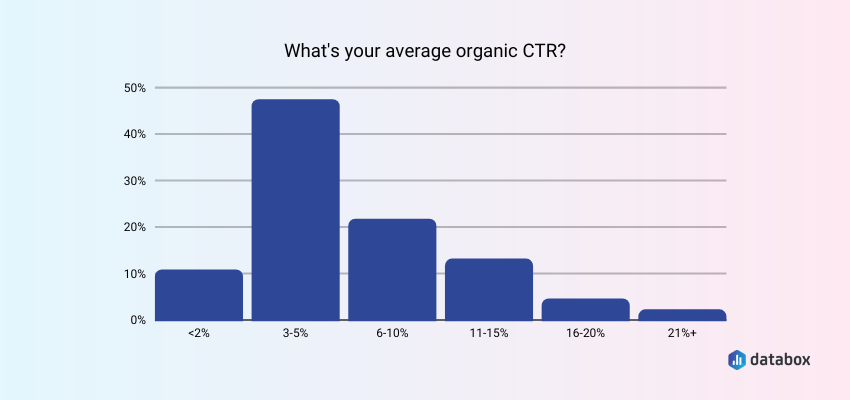
Ultimately, your previous CTRs (CTR curve) should be your benchmark. Weigh your progress against similar performance, as all websites are not equal.
What should you do if your CTR is below 3%?
I’m assuming you appear higher up on search results. If that is the case, tweak your meta descriptions. Make it more attractive.
Otherwise, focus on ranking on the top pages of SERPs.
Additional Tips for Learning SEO
Despite popular belief, the fundamentals of SEO remain constant. However, minor details are continually altered.
With that in mind, you should have your finger on the pulse. Be proactive and open to learning.
The following tips can help:
Listen to SEO Podcasts
Podcasters frequently interview skilled SEOs about their achievements, mistakes, and experiences, making podcasts an excellent method to stay up-to-date while on the go. In one episode of the Authority Hacker podcast, for example, link-building guru Bibi discusses her inventive approach to link outreach mailings.
Similar to podcasts: subscribe to SEO newsletters too. Follow top voices in the SEO world — current and previous employees of Google, for example.
Official Sources
Google’s Search Central releases official algorithm updates and announcements. Do well to follow that. You’d learn about the updates as soon as they are released.
That way, you’d be abridged on the best practices.
Tip: Google recently announced that FAQs will be scraped on search results.
If you’re not a fan of blogs, check Google’s YouTube channel. In particular, look out for weekly “office hours” hangouts.
Also, follow Google search representatives on X (formerly Twitter), such as John Mueller and Gary Illyes.
Read SEO News
Search Engine Roundtable bills itself as the “pulse of search marketing,” publishing daily updates on search queries. Do well to subscribe to it.
Other reputable sources include Search Engine Land and Search Engine Journal. They both post news regularly. But the latter is my favorite — the articles often have a humorous undertone.
Teach Others What You Know
This may sound paradoxical, considering your want to learn more about SEO. But I’ve discovered that educating others helps me retain and assimilate knowledge.
This way, I’ll be compelled to explain and critique my thoughts. That introspection will reveal my knowledge depth (more like expose you to scrutiny) and spur me to learn more.
You can adopt that strategy too.
Note: while teaching SEO can be done publicly on a blog or a YouTube channel, it can also be done semi-discreetly (in groups and communities) or privately (via direct messages, face-to-face).
If you’re brave enough, teaching SEO “publicly” can provide extra protection against disinformation because people are usually gracious enough to correct you when you’re wrong.
Ask Questions When in Doubt
If something bothers you, don’t be shy. Ask questions. Network with other SEOs.
No one knows it all.
SEO Learning Never Stops
Algorithm updates are released almost daily. That is why the “how to learn SEO” piece you read in 2017 will be outdated today.
In essence, stay current to know the best SEO practices. That is what separates the experts from rookies.
More importantly, practice. Otherwise, you won’t know if you have truly learned anything.
If you’re worried about cost, you can do virtually all the steps in this guide for free.
For example, instead of building a site, create a free WordPress subdomain.
Bottom line: test your hand and master the steps. Then, spend money on your expertise.
Besides, you can upgrade the test site to a full-fledged website later.

